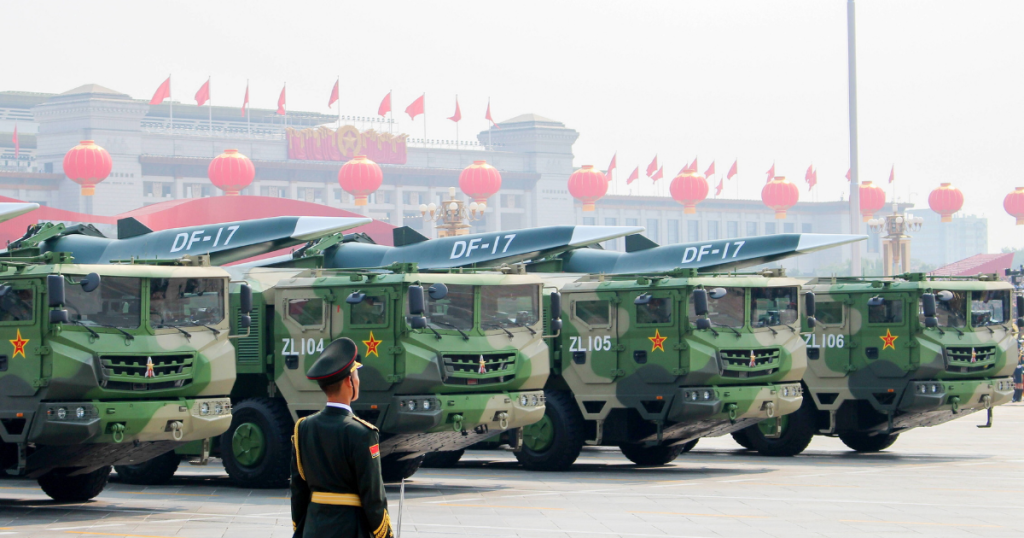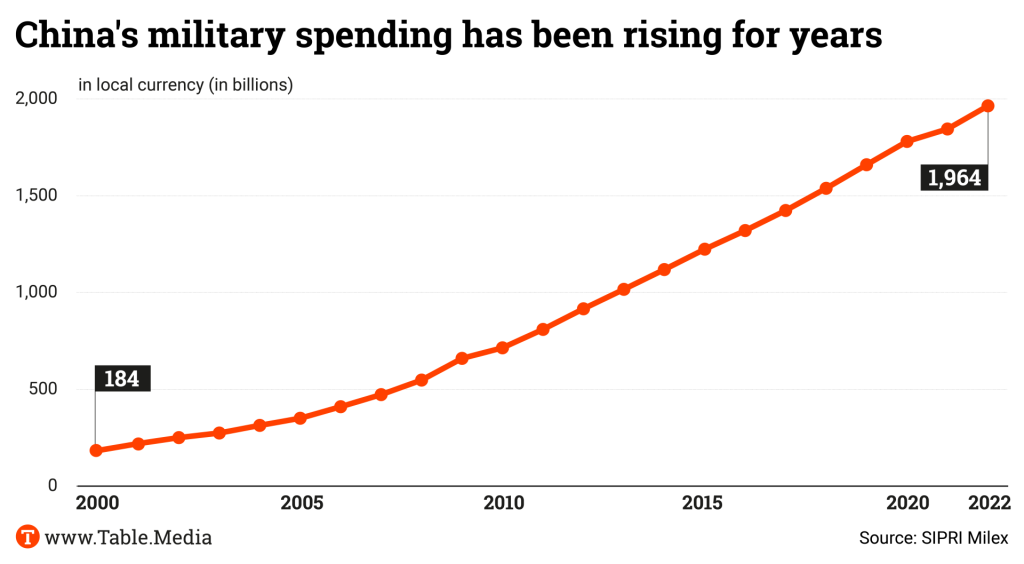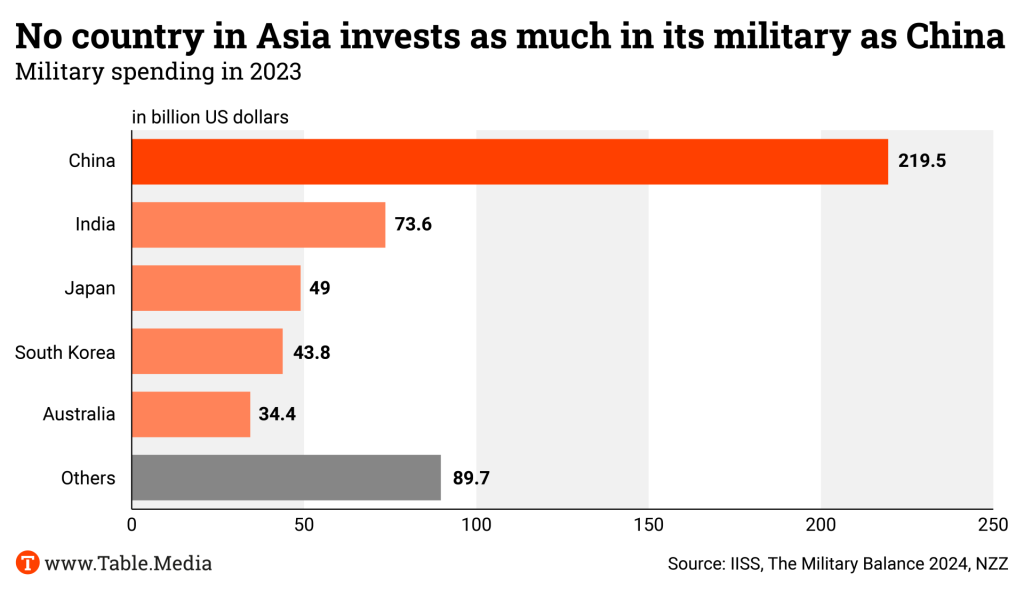Donald Trump’s threat to abandon delinquent NATO allies has not only alarmed the Europeans. Should Trump be re-elected US President this fall, the countries of the Indo-Pacific can no longer fully rely on the support of the USA either. And unlike the Europeans, the Asian states have already recognized this risk during Trump’s first term and have been building up their military for some time now.
However, this comes at a high price. Some of these countries have spent so much money on the military that their debts are piling up. It is not only the high acquisition costs for heavy military equipment, but also the running costs that drive them into debt, writes Michael Radunski in his analysis at today’s kick-off of the Munich Security Conference.
The dispute at Berlin-based AI start-up Nyonic is a setback for growing European AI expertise. Feiyu Xu and Hans Uzkoreit, two icons of German AI research, are departing the company in which the German government had placed high hopes. However, fears that their departure will give Chinese competitors an advantage are unfounded, writes Carolyn Braun. Perhaps the duo can really take off without the quarrel with the co-owner.


Never before have Asian countries spent so much on military, weapons and defense as they did last year: a total of 510 billion US dollars. This is according to “The Military Balance,” the latest armaments report from the renowned International Institute for Strategic Studies (IISS). In nominal terms, spending increased by 2.8 percent compared to the previous year, while in real terms, growth was as high as 4.6 percent.
The increase is actually in line with previous years. However, a new trend is emerging – and it is a cause for concern: defense spending now exceeds economic growth in many countries. This raises the question of fiscal sustainability. Long-term defense projects could especially push some countries into a kind of financial arms trap.
But first, the reasons for the record-high defense spending: China is building up its military. According to IISS figures, China accounts for around 43 percent of regional defense spending. Beijing puts its current defense budget at 1.55 trillion yuan (219.5 billion US dollars). And many experts suspect that the actual defense spending is even higher. Of course, this is still far below the US budget of 905 billion US dollars. But it is also true that it corresponds to a nominal increase of 7.2 percent compared to the previous year.

President Xi Jinping is extensively modernizing the People’s Liberation Army – away from the world’s largest army and towards a mobile, strategic military power. Among other things, the DF-27 (CH-SS-X-24) medium-range ballistic missile with a hypersonic glide missile is currently under development to overcome missile defense systems. The Chinese Navy now has more warships than the US Navy – and with the Fujian, a third, significantly more powerful aircraft carrier is about to enter service. And presumed spy balloons over the USA and Taiwan also contribute to a sense of latent threat in the respective countries.
Added to this is Beijing’s increasingly robust behavior – not only towards the USA, but above all towards the countries in the region:
The reaction of these states is clear and understandable: They are arming themselves – on an unprecedented scale.

However, none of these investments are one-off payments. Instead, they are long-term defense projects. Governments commit to years of spending. And this is precisely where the big risk lies – especially for Asia’s advanced economies.
Economic growth in these countries is already expected to average just 1.7 percent this year. Japan groans under a high national debt, while Australia has to bear not only the purchase costs for the nuclear submarines but also payments for personnel and maintenance of the ships over their entire service life. And if the security situation in the region were to deteriorate further, economic momentum would also continue to weaken. It is a cycle of rising costs and falling income.
Added to this is the enormous uncertainty regarding the upcoming presidential election in the United States. Washington is the main ally for all these countries – especially regarding security and defense. Donald Trump has recently reiterated his interpretation of American loyalty to the alliance: “You don’t pay your bills, you get no protection. It’s very simple,” said Trump in South Carolina. Although the remark was aimed at the NATO members, who will probably no longer be able to count on American protection from Russia under him as US President, Trump had already made similar comments about South Korea. And so Trump and China push Asian countries to make further investments in armaments and defense – including unforeseeable financial risks.

The Berlin start-up Nyonic was one of the great German or even European hopes in the global AI race. However, the departure of four of the five company founders, which was founded in the early summer of last year, could lead to disappointment. It is doubtful whether the remaining CEO Dong Han will be able to convince Western investors to invest under these circumstances. He had planned to focus the company more on the Chinese market.
On the surface, Han has won the internal power struggle. Nyonic was founded with the vision of creating AI models with a special focus on the European industry, taking EU regulations into account and making Europe less dependent on existing suppliers in the USA and China. It could have been a kind of “ChatGPT for companies.” Nyonic would have developed a general-purpose large language model for companies. For example, it could have learned design languages, written computer code or calculated 3D models.
A group of renowned AI experts founded the company last year:
Company sources claim Han did not share his co-founders’ vision of building a European AI lighthouse project. Instead, his primary concern is said to have been to consolidate power within the company. Nyonic did not respond to a contact request from Table.Media.
In addition to Cann, Otterbach and the married couple Xu-Uszkoreit, other employees are leaving the company. These include Patrick Bunk, who has been responsible for the product division at Nyonic for a full six weeks since the beginning of January. Bunk, himself the founder of Ubermetrics, which he sold a few years ago, was supposed to succeed Feiyu Xu, who was due to take over as CEO in early January – according to a unanimous board decision in December. Patrick Bunk also confirms that Han blocked this decision and thus triggered the exodus of the other four.
A look at the company’s organizational chart helps understand how this could happen. Berlin-based Nyonic GmbH, whose CEOs until recently were Cann, Uszkoreit and Han, has a sister company in Shanghai. Han, who also lives there, runs it. The two sister companies were merged last summer under the umbrella of a holding company set up specifically for this purpose: reInventAI (Cayman) Co. Ltd. based in the Cayman Islands – a structure for which Nyonic had already come in for heavy criticism last year.
Han holds the majority of voting shares on the board of this company, which was also just founded in the summer of 2023, and can give orders to the German company. Persons familiar with the matter say this was already a mistake when the company was founded.
Although the agreement was that he would gradually hand over the voting rights to his co-founders, which he refused – even though seed investor Lenovo, Xu and Uszkoreit’s former employer, had insisted on him doing so.
Lenovo had invested a low double-digit million sum in the start-up. It can be assumed that the reason for Lenovo’s investment in the company was the trust it placed in its former top employees Xu and Uszkoreit, who were unhappy to see them virtually disempowered.
The other founders could now have insisted on enforcing the agreements made. However, such a legal dispute would have dragged on for a long time and de facto paralyzed the young company.
These internal disputes also made the company unappealing to investors. “For European investors in particular, a company with such a non-transparent structure, where power is in the hands of a single person, is unattractive,” says Bunk. However, Nyonic was explicitly looking for a European or American investor to ensure a neutral financing position after the initial investment by Chinese-American Lenovo.
Unsuccessfully: After Lenovo’s seed investment, Nyonic was unable to attract further investors. Instead, Han saw opportunities in the Chinese AI market, both in terms of local demand and investors. This is because in the People’s Republic – that is the hope – less stringent governance and transparency requirements can be expected. However, this would mean disregarding the core concerns of his four co-founders. Ultimately, Xu and her co-founders had to choose between a years-long legal dispute or their departure.
According to documents in the German Commercial Register, former CEOs Cann and Uszkoreit resigned on 19 and 23 January, respectively. So at least there is now hope that a non-competition clause will not hinder Cann, Xu, Uszkoreit and Otterbach and can start a new attempt to get a European AI project off the ground.
Bunk is by no means ruling it out. He can imagine being back on board: “However, the market has developed rapidly over the past year, and the ideas will have to be modified.”
Reinhard Karger, spokesperson for the German Research Center for Artificial Intelligence (DFKI), calls the current developments at Nyonic extremely regrettable: “It is to be hoped that the founders who are now leaving Nyonic will continue to pursue this innovation field, which is crucial for European AI sovereignty, in a new organization.”
What will become of Berlin-based Nyonic GmbH is uncertain. At the beginning of February, its employees learned that the lease for the office space had been terminated, and some employees – like Bunk – were already laid off at the end of January. Market experts believe it is unlikely that the company’s current staffing and governance structure will be able to convince any investors – be it in the West or the People’s Republic.
Feb. 20, 2024; 9:30 p.m. CET (Feb. 21, 2024; 4:30 a.m. CST)
Center for Strategic & International Studies CSIS, Webcast: A Conversation with U.S. Ambassador to the United Nations Linda Thomas-Greenfield on U.S. Diplomacy in the Pacific Islands More
Feb. 21, 2024; 2:30 a.m. CET (9:30 a.m. CST)
Fairbank Center for Chinese Studies, Urban China Lecture Series (also via Zoom): Shawn SK Teo – Two Experiments in Theorizing (with) Urban China More
Feb. 23, 2024; 9:30 a.m. CET (4:30 p.m. CST)
CNBW + German Center + Roedl & Partner China, Hybrid Seminar: Main changes of the new Company Law More
Feb. 26, 2024; 6:30 p.m. CAT
German Chamber of Commerce in China – North China: German Chamber New Year’s Reception 2024: Economic Outlook More
Feb. 27, 2024; 8:30 a.m. CET (3:30 p.m. CST)
CNBW Working group “Sino-German Corporate Communications” (online): How to navigate China’s “Xiaohongshu” (小红书) for your business More
Feb. 27, 2024; 9 a.m. CET (4 p.m. CST)
EU SME Centre, the European Chamber and the China IP SME Helpdesk, Beijing & online: Ready for 2024: An SME-Friendly Overview of the IP Regulatory Landscape and Compliance Considerations More
Feb. 27, 2024; 9:30 a.m. CET (4:30 p.m. CST)
EU SME Center, Webinar: Fast-Tracking International Trade: Selling and Buying on Alibaba.com for SMEs More
Chinese Foreign Minister Wang Yi will attend the Munich Security Conference in Germany and also travel to Spain and France. The Chinese Foreign Ministry made the announcement on its website on Thursday.
Wang will give a speech at the China Seminar at the Munich conference. He will elaborate on China’s plans “on building a community with a shared future for mankind” and advocate an “equal and orderly multipolar world.”
He plans to participate in a strategic dialogue in France. The British newspaper Guardian reports that Wang will also meet British Foreign Secretary David Cameron in Munich. A meeting is also planned with EU Foreign Affairs Commissioner Josep Borrell on the sidelines of the conference. It is unknown whether there will also be a separate meeting with German Chancellor Scholz or Foreign Minister Annalena Baerbock. rtr/flee
Longi Green Energy Technology, the world’s largest solar module manufacturer, has warned that Europe and the US risk delaying the energy transition if they ban Chinese companies from their supply chains. Dennis She, Vice President of the Chinese company, said this to the Financial Times. The cost of solar modules manufactured in countries like the USA would be “twice as high” without Chinese involvement.
Dennis She also warned of job losses: “You don’t need to kill most of the jobs from the downstream to protect 1 percent [of the European jobs in solar manufacturing] – it doesn’t make sense,” he said.
China dominates solar production, accounting for over 80 percent of the global output. Longi holds around 20 percent of the global market for photovoltaic modules. Europe produces less than three percent of the solar modules needed to achieve the target of generating 42.5 percent of energy from renewable sources by 2030. According to energy consultancy Wood Mackenzie, the cost of producing solar panels in China fell by more than 40 percent last year to around 15 cents per watt, compared to 30 cents in Europe and 40 cents in the US. This decline is partly due to lower material costs and oversupply.
The debate on how to deal with Chinese dominance has come to a head in recent weeks. The EU Commission initially rejected the European solar industry’s plea for help against Chinese price pressure – arguing that the green transition needed cheap Chinese imports.
On Thursday, the European Solar Manufacturing Council (ESMC) issued an urgent warning against Chinese companies taking over the European market and manufacturing their solar panels using forced labor. “The same rules should apply to imported goods as to production in the EU,” said ESMC Secretary-General Johan Lindahl.
“The EU is building its future on the backs of Uyghur slaves,” said human rights activist Rushan Abbas. Together with researcher Adrian Zenz, she called on the EU to hold the Chinese government to account. Abbas warned that Europe runs the risk of becoming a dumping ground for solar modules that can no longer be sold in the USA due to forced labor regulations. cyb/ari
According to the Berlin-based China Institute Merics, access to important information and data from China is becoming increasingly difficult. According to a recent study conducted by the institute, the Chinese government releases less government information while simultaneously demanding that third-party data providers restrict foreign access. The study says that geopolitical tensions are one of the main reasons for the government’s approach. In this way, it wants to avoid using information to criticize its policies.
The restrictions affect almost all areas of information – albeit to varying degrees, Merics states in the study. Technology policy, for example, is the most restricted area. Competition with Western countries in science and technology means that Beijing carefully weighs up access to important data in this area.
“Politicians and companies must be aware that they need to invest more resources in order to obtain up-to-date, essential information from China that they need for their assessments and business,” says Merics program manager Katja Drinhausen. It is no longer just a matter of interpreting data correctly, but of obtaining it in the first place, she said. flee

The Standing Committee of the People’s Congress will convene at the end of February to prepare for the annual session of the socialist parliament on March 5. On the agenda is a review of the latest draft for a revision of the State Secrets Protection Law, which is to be passed by the People’s Congress. It is among half a dozen new security and counter-espionage laws China has passed in recent years. Beijing has become obsessed with control. This benefits its Ministry of State Security, which has been operating in the shadows for decades. It sees itself on the upswing and now openly shares its views on a website specifically for this purpose.
A Mr. Zhang was on the phone. He claimed to be from Beijing State Security. He didn’t ask if he could meet me, just “when.” He said in a cafeteria in the Zhaolong Hotel, just across from my Sanlitun apartment complex.
I knew what was going on. State Security regularly invited me to “have a tea” 喝茶, as we correspondents called it, whenever we were given informal summons where we were either warned or intimidated. Chinese citizens, who are summoned in a much ruder tone, use the auxiliary verb 被 before their “invitation to have tea.” The passive form 被喝茶 means “to be forced to drink tea.”
Around the year 2000, the so-called “civilian method” first emerged, to which State Security invited presumed threats to the socialist order – initially with a jovial undertone: “Let’s go out for a meal, drink tea and have a chat” (吃个饭。 喝个茶 聊个天). The short form “drinking tea” soon entered everyday vocabulary as slang.
The two police officers who asked to meet me for a cup of tea in late July 2016 correctly identified themselves as members of the State Security Service. They quickly got to the point. They knew (from an unnamed source) that I would soon be traveling to the celebrity beach resort of Beidaihe, where China’s top leadership spends its summer break. They said they had read my earlier stories about Beidaihe and warned me not to snoop around high-ranking officials again. And they wanted me to sign a statement they had brought with them. I refused, telling them I had the right to go to Beidaihe. As an accredited journalist, I would write about their warning in my newspaper – which I did.
Drinking tea with the political police was one of the more harmless forms of harassment that foreign correspondents experienced in their daily work. Chinese citizens, on the other hand, were intimidated. They could neither protest nor sue the authorities for abuse of authority.
It is all the more astonishing that at the end of January, State Security suddenly not only professed the slang term “tea drinking” but also praised this civilian form of interrogation as a legitimate and legal police method – people could be “questioned or investigated on suspicion of illegal crimes”(因涉嫌违法犯罪被约谈或接受调查). This is according to a report on the official Weixin state security website, which has been online since last August. It refers to recent laws, such as the Criminal Procedure Law or the Counterintelligence Law, which came into force in 2023.
Even more grotesque is the subsequent, cynical warning to the public not to cross the “ten red lines.” Under the title: “Don’t let our authorities invite you to ten cups of tea,” 别让国家安全机关请你喝这 十杯茶 follows the list. It is visually highlighted on the website as if it were a tea ceremony:
第一杯 “茶”:涉嫌危害国家安全犯罪 The first cup of “tea” is for those suspected of crimes that endanger state security.
第二杯 “茶”:实施间谍行为或帮助行为 The second cup of “tea” is for those who spies or assists in spying.
第三杯 “茶”:未落实反间谍安全防范主体责任 The third cup of “tea” concerns those mainly to blame for the lack of counter-espionage security measures.
第四杯 “茶”:违反涉及国家安全事项的建设项目许可 The fourth cup of “tea” is for all those who fail to properly implement state security projects.
第五杯 “茶”:拒不配合调查间谍行为 The fifth cup of “tea” is for those who refuse to cooperate with investigations into espionage activities.
第六杯 “茶”:非法获取或持有国家秘密 The sixth cup of “tea” is for those who illegally obtain or hold state secrets.
第七杯“茶”:非法生产、销售、持有、使用间谍器材 The seventh cup of “tea” is for those who illegally manufacture, sell, possess or use espionage equipment.
第八杯 “茶”:泄露反间谍和情报工作的国家秘密 The eighth cup of “tea” is for those who reveal state secrets of counterintelligence or intelligence services.
第九杯 “茶”:违反限期出境等决定 The ninth cup of “tea” is for those who fail to leave the country on time or violate other regulations.
第十杯 “茶”:实施间谍行为以外的危害国家安全行为 The tenth cup of “tea” is for those who endanger security in ways other than espionage.

Many Chinese newspapers and official websites, previously forbidden to mention the code word “tea drinking,” now printed the State Security “guide.” Other online reports appeared on the net, including some that were previously blocked by censorship, such as guides on how a critical citizen should behave when summoned to have tea with the police.
The former editor-in-chief of the South China Morning Post, Wang Xiangwei, asked in a much-publicized commentary why the secretive Ministry of State Security “is stepping out of the shadows.”
Since Xi Jinping came to power at the end of 2012, national security has become the buzzword of a party that is distrustful both internally and externally and senses enemies everywhere; since 2015, new laws and campaigns have been launched aimed at protecting state secrets and countering espionage.
No wonder the Ministry of State Security feels to be on the upswing. It has its anti-espionage hotline 12339 posted in many cities and offers rewards of up to 500,000 yuan (70,000 US dollars) for successful denunciations. Through its new official Weixin website, it acts as a radical mouthpiece for the CP leadership and influences public opinion, recently threatening to persecute anyone who badmouths China’s economic situation and thus sabotages the official optimistic propaganda.

Its essay on police “tea drinking” is just one of well over 100 online articles that have been printed since the launch of the new website. However, it still does not explain what China’s State Security considers “espionage” and what it regards as a state secret. Raids on foreign consulting firms, arrests and secret convictions of alleged spies in state security trials only recently made spectacular headlines again. Human rights organizations have accused China’s judiciary of pervasive legal violations.
The fact that the term “tea drinking,” of all things, has become a synonym for a method of interrogation used by the political police and that the police admit to it devalues a thousand-year-old traditional concept and part of Chinese culture. Just last fall, after 13 years of waiting, UNESCO inscribed a cultural landscape of old tea forests and the social practices associated with tea on its list of Intangible Cultural Heritage of Humanity. The news agency Xinhua proudly praised China as the “first tea culture UNESCO heritage site status.”
I was at least indirectly able to avoid my invitation to have tea at the Zhaoling Hotel in July 2016. I insisted on ordering a coffee. At the expense of State Security.
Georg Stiebel was promoted from Project Manager to Project Director at MPS Construction Engineering in Shanghai – a company that plans, implements and monitors industrial construction projects.
Jony Geng has been Greater China Sales Leader at software service provider IFS Cloud since the end of last year. Prior to this, he worked for Microsoft in Shanghai for six years in various positions.
Is something changing in your organization? Let us know at heads@table.media!

After the New Year celebrations, traveling is next on the to-do list in China: tourists love the spectacular scenic bridge in Taizhou, Zhejiang province, which winds its way across the gorge like the long body of a dragon. Ah right, it is the Year of the Dragon, after all.
Donald Trump’s threat to abandon delinquent NATO allies has not only alarmed the Europeans. Should Trump be re-elected US President this fall, the countries of the Indo-Pacific can no longer fully rely on the support of the USA either. And unlike the Europeans, the Asian states have already recognized this risk during Trump’s first term and have been building up their military for some time now.
However, this comes at a high price. Some of these countries have spent so much money on the military that their debts are piling up. It is not only the high acquisition costs for heavy military equipment, but also the running costs that drive them into debt, writes Michael Radunski in his analysis at today’s kick-off of the Munich Security Conference.
The dispute at Berlin-based AI start-up Nyonic is a setback for growing European AI expertise. Feiyu Xu and Hans Uzkoreit, two icons of German AI research, are departing the company in which the German government had placed high hopes. However, fears that their departure will give Chinese competitors an advantage are unfounded, writes Carolyn Braun. Perhaps the duo can really take off without the quarrel with the co-owner.


Never before have Asian countries spent so much on military, weapons and defense as they did last year: a total of 510 billion US dollars. This is according to “The Military Balance,” the latest armaments report from the renowned International Institute for Strategic Studies (IISS). In nominal terms, spending increased by 2.8 percent compared to the previous year, while in real terms, growth was as high as 4.6 percent.
The increase is actually in line with previous years. However, a new trend is emerging – and it is a cause for concern: defense spending now exceeds economic growth in many countries. This raises the question of fiscal sustainability. Long-term defense projects could especially push some countries into a kind of financial arms trap.
But first, the reasons for the record-high defense spending: China is building up its military. According to IISS figures, China accounts for around 43 percent of regional defense spending. Beijing puts its current defense budget at 1.55 trillion yuan (219.5 billion US dollars). And many experts suspect that the actual defense spending is even higher. Of course, this is still far below the US budget of 905 billion US dollars. But it is also true that it corresponds to a nominal increase of 7.2 percent compared to the previous year.

President Xi Jinping is extensively modernizing the People’s Liberation Army – away from the world’s largest army and towards a mobile, strategic military power. Among other things, the DF-27 (CH-SS-X-24) medium-range ballistic missile with a hypersonic glide missile is currently under development to overcome missile defense systems. The Chinese Navy now has more warships than the US Navy – and with the Fujian, a third, significantly more powerful aircraft carrier is about to enter service. And presumed spy balloons over the USA and Taiwan also contribute to a sense of latent threat in the respective countries.
Added to this is Beijing’s increasingly robust behavior – not only towards the USA, but above all towards the countries in the region:
The reaction of these states is clear and understandable: They are arming themselves – on an unprecedented scale.

However, none of these investments are one-off payments. Instead, they are long-term defense projects. Governments commit to years of spending. And this is precisely where the big risk lies – especially for Asia’s advanced economies.
Economic growth in these countries is already expected to average just 1.7 percent this year. Japan groans under a high national debt, while Australia has to bear not only the purchase costs for the nuclear submarines but also payments for personnel and maintenance of the ships over their entire service life. And if the security situation in the region were to deteriorate further, economic momentum would also continue to weaken. It is a cycle of rising costs and falling income.
Added to this is the enormous uncertainty regarding the upcoming presidential election in the United States. Washington is the main ally for all these countries – especially regarding security and defense. Donald Trump has recently reiterated his interpretation of American loyalty to the alliance: “You don’t pay your bills, you get no protection. It’s very simple,” said Trump in South Carolina. Although the remark was aimed at the NATO members, who will probably no longer be able to count on American protection from Russia under him as US President, Trump had already made similar comments about South Korea. And so Trump and China push Asian countries to make further investments in armaments and defense – including unforeseeable financial risks.

The Berlin start-up Nyonic was one of the great German or even European hopes in the global AI race. However, the departure of four of the five company founders, which was founded in the early summer of last year, could lead to disappointment. It is doubtful whether the remaining CEO Dong Han will be able to convince Western investors to invest under these circumstances. He had planned to focus the company more on the Chinese market.
On the surface, Han has won the internal power struggle. Nyonic was founded with the vision of creating AI models with a special focus on the European industry, taking EU regulations into account and making Europe less dependent on existing suppliers in the USA and China. It could have been a kind of “ChatGPT for companies.” Nyonic would have developed a general-purpose large language model for companies. For example, it could have learned design languages, written computer code or calculated 3D models.
A group of renowned AI experts founded the company last year:
Company sources claim Han did not share his co-founders’ vision of building a European AI lighthouse project. Instead, his primary concern is said to have been to consolidate power within the company. Nyonic did not respond to a contact request from Table.Media.
In addition to Cann, Otterbach and the married couple Xu-Uszkoreit, other employees are leaving the company. These include Patrick Bunk, who has been responsible for the product division at Nyonic for a full six weeks since the beginning of January. Bunk, himself the founder of Ubermetrics, which he sold a few years ago, was supposed to succeed Feiyu Xu, who was due to take over as CEO in early January – according to a unanimous board decision in December. Patrick Bunk also confirms that Han blocked this decision and thus triggered the exodus of the other four.
A look at the company’s organizational chart helps understand how this could happen. Berlin-based Nyonic GmbH, whose CEOs until recently were Cann, Uszkoreit and Han, has a sister company in Shanghai. Han, who also lives there, runs it. The two sister companies were merged last summer under the umbrella of a holding company set up specifically for this purpose: reInventAI (Cayman) Co. Ltd. based in the Cayman Islands – a structure for which Nyonic had already come in for heavy criticism last year.
Han holds the majority of voting shares on the board of this company, which was also just founded in the summer of 2023, and can give orders to the German company. Persons familiar with the matter say this was already a mistake when the company was founded.
Although the agreement was that he would gradually hand over the voting rights to his co-founders, which he refused – even though seed investor Lenovo, Xu and Uszkoreit’s former employer, had insisted on him doing so.
Lenovo had invested a low double-digit million sum in the start-up. It can be assumed that the reason for Lenovo’s investment in the company was the trust it placed in its former top employees Xu and Uszkoreit, who were unhappy to see them virtually disempowered.
The other founders could now have insisted on enforcing the agreements made. However, such a legal dispute would have dragged on for a long time and de facto paralyzed the young company.
These internal disputes also made the company unappealing to investors. “For European investors in particular, a company with such a non-transparent structure, where power is in the hands of a single person, is unattractive,” says Bunk. However, Nyonic was explicitly looking for a European or American investor to ensure a neutral financing position after the initial investment by Chinese-American Lenovo.
Unsuccessfully: After Lenovo’s seed investment, Nyonic was unable to attract further investors. Instead, Han saw opportunities in the Chinese AI market, both in terms of local demand and investors. This is because in the People’s Republic – that is the hope – less stringent governance and transparency requirements can be expected. However, this would mean disregarding the core concerns of his four co-founders. Ultimately, Xu and her co-founders had to choose between a years-long legal dispute or their departure.
According to documents in the German Commercial Register, former CEOs Cann and Uszkoreit resigned on 19 and 23 January, respectively. So at least there is now hope that a non-competition clause will not hinder Cann, Xu, Uszkoreit and Otterbach and can start a new attempt to get a European AI project off the ground.
Bunk is by no means ruling it out. He can imagine being back on board: “However, the market has developed rapidly over the past year, and the ideas will have to be modified.”
Reinhard Karger, spokesperson for the German Research Center for Artificial Intelligence (DFKI), calls the current developments at Nyonic extremely regrettable: “It is to be hoped that the founders who are now leaving Nyonic will continue to pursue this innovation field, which is crucial for European AI sovereignty, in a new organization.”
What will become of Berlin-based Nyonic GmbH is uncertain. At the beginning of February, its employees learned that the lease for the office space had been terminated, and some employees – like Bunk – were already laid off at the end of January. Market experts believe it is unlikely that the company’s current staffing and governance structure will be able to convince any investors – be it in the West or the People’s Republic.
Feb. 20, 2024; 9:30 p.m. CET (Feb. 21, 2024; 4:30 a.m. CST)
Center for Strategic & International Studies CSIS, Webcast: A Conversation with U.S. Ambassador to the United Nations Linda Thomas-Greenfield on U.S. Diplomacy in the Pacific Islands More
Feb. 21, 2024; 2:30 a.m. CET (9:30 a.m. CST)
Fairbank Center for Chinese Studies, Urban China Lecture Series (also via Zoom): Shawn SK Teo – Two Experiments in Theorizing (with) Urban China More
Feb. 23, 2024; 9:30 a.m. CET (4:30 p.m. CST)
CNBW + German Center + Roedl & Partner China, Hybrid Seminar: Main changes of the new Company Law More
Feb. 26, 2024; 6:30 p.m. CAT
German Chamber of Commerce in China – North China: German Chamber New Year’s Reception 2024: Economic Outlook More
Feb. 27, 2024; 8:30 a.m. CET (3:30 p.m. CST)
CNBW Working group “Sino-German Corporate Communications” (online): How to navigate China’s “Xiaohongshu” (小红书) for your business More
Feb. 27, 2024; 9 a.m. CET (4 p.m. CST)
EU SME Centre, the European Chamber and the China IP SME Helpdesk, Beijing & online: Ready for 2024: An SME-Friendly Overview of the IP Regulatory Landscape and Compliance Considerations More
Feb. 27, 2024; 9:30 a.m. CET (4:30 p.m. CST)
EU SME Center, Webinar: Fast-Tracking International Trade: Selling and Buying on Alibaba.com for SMEs More
Chinese Foreign Minister Wang Yi will attend the Munich Security Conference in Germany and also travel to Spain and France. The Chinese Foreign Ministry made the announcement on its website on Thursday.
Wang will give a speech at the China Seminar at the Munich conference. He will elaborate on China’s plans “on building a community with a shared future for mankind” and advocate an “equal and orderly multipolar world.”
He plans to participate in a strategic dialogue in France. The British newspaper Guardian reports that Wang will also meet British Foreign Secretary David Cameron in Munich. A meeting is also planned with EU Foreign Affairs Commissioner Josep Borrell on the sidelines of the conference. It is unknown whether there will also be a separate meeting with German Chancellor Scholz or Foreign Minister Annalena Baerbock. rtr/flee
Longi Green Energy Technology, the world’s largest solar module manufacturer, has warned that Europe and the US risk delaying the energy transition if they ban Chinese companies from their supply chains. Dennis She, Vice President of the Chinese company, said this to the Financial Times. The cost of solar modules manufactured in countries like the USA would be “twice as high” without Chinese involvement.
Dennis She also warned of job losses: “You don’t need to kill most of the jobs from the downstream to protect 1 percent [of the European jobs in solar manufacturing] – it doesn’t make sense,” he said.
China dominates solar production, accounting for over 80 percent of the global output. Longi holds around 20 percent of the global market for photovoltaic modules. Europe produces less than three percent of the solar modules needed to achieve the target of generating 42.5 percent of energy from renewable sources by 2030. According to energy consultancy Wood Mackenzie, the cost of producing solar panels in China fell by more than 40 percent last year to around 15 cents per watt, compared to 30 cents in Europe and 40 cents in the US. This decline is partly due to lower material costs and oversupply.
The debate on how to deal with Chinese dominance has come to a head in recent weeks. The EU Commission initially rejected the European solar industry’s plea for help against Chinese price pressure – arguing that the green transition needed cheap Chinese imports.
On Thursday, the European Solar Manufacturing Council (ESMC) issued an urgent warning against Chinese companies taking over the European market and manufacturing their solar panels using forced labor. “The same rules should apply to imported goods as to production in the EU,” said ESMC Secretary-General Johan Lindahl.
“The EU is building its future on the backs of Uyghur slaves,” said human rights activist Rushan Abbas. Together with researcher Adrian Zenz, she called on the EU to hold the Chinese government to account. Abbas warned that Europe runs the risk of becoming a dumping ground for solar modules that can no longer be sold in the USA due to forced labor regulations. cyb/ari
According to the Berlin-based China Institute Merics, access to important information and data from China is becoming increasingly difficult. According to a recent study conducted by the institute, the Chinese government releases less government information while simultaneously demanding that third-party data providers restrict foreign access. The study says that geopolitical tensions are one of the main reasons for the government’s approach. In this way, it wants to avoid using information to criticize its policies.
The restrictions affect almost all areas of information – albeit to varying degrees, Merics states in the study. Technology policy, for example, is the most restricted area. Competition with Western countries in science and technology means that Beijing carefully weighs up access to important data in this area.
“Politicians and companies must be aware that they need to invest more resources in order to obtain up-to-date, essential information from China that they need for their assessments and business,” says Merics program manager Katja Drinhausen. It is no longer just a matter of interpreting data correctly, but of obtaining it in the first place, she said. flee

The Standing Committee of the People’s Congress will convene at the end of February to prepare for the annual session of the socialist parliament on March 5. On the agenda is a review of the latest draft for a revision of the State Secrets Protection Law, which is to be passed by the People’s Congress. It is among half a dozen new security and counter-espionage laws China has passed in recent years. Beijing has become obsessed with control. This benefits its Ministry of State Security, which has been operating in the shadows for decades. It sees itself on the upswing and now openly shares its views on a website specifically for this purpose.
A Mr. Zhang was on the phone. He claimed to be from Beijing State Security. He didn’t ask if he could meet me, just “when.” He said in a cafeteria in the Zhaolong Hotel, just across from my Sanlitun apartment complex.
I knew what was going on. State Security regularly invited me to “have a tea” 喝茶, as we correspondents called it, whenever we were given informal summons where we were either warned or intimidated. Chinese citizens, who are summoned in a much ruder tone, use the auxiliary verb 被 before their “invitation to have tea.” The passive form 被喝茶 means “to be forced to drink tea.”
Around the year 2000, the so-called “civilian method” first emerged, to which State Security invited presumed threats to the socialist order – initially with a jovial undertone: “Let’s go out for a meal, drink tea and have a chat” (吃个饭。 喝个茶 聊个天). The short form “drinking tea” soon entered everyday vocabulary as slang.
The two police officers who asked to meet me for a cup of tea in late July 2016 correctly identified themselves as members of the State Security Service. They quickly got to the point. They knew (from an unnamed source) that I would soon be traveling to the celebrity beach resort of Beidaihe, where China’s top leadership spends its summer break. They said they had read my earlier stories about Beidaihe and warned me not to snoop around high-ranking officials again. And they wanted me to sign a statement they had brought with them. I refused, telling them I had the right to go to Beidaihe. As an accredited journalist, I would write about their warning in my newspaper – which I did.
Drinking tea with the political police was one of the more harmless forms of harassment that foreign correspondents experienced in their daily work. Chinese citizens, on the other hand, were intimidated. They could neither protest nor sue the authorities for abuse of authority.
It is all the more astonishing that at the end of January, State Security suddenly not only professed the slang term “tea drinking” but also praised this civilian form of interrogation as a legitimate and legal police method – people could be “questioned or investigated on suspicion of illegal crimes”(因涉嫌违法犯罪被约谈或接受调查). This is according to a report on the official Weixin state security website, which has been online since last August. It refers to recent laws, such as the Criminal Procedure Law or the Counterintelligence Law, which came into force in 2023.
Even more grotesque is the subsequent, cynical warning to the public not to cross the “ten red lines.” Under the title: “Don’t let our authorities invite you to ten cups of tea,” 别让国家安全机关请你喝这 十杯茶 follows the list. It is visually highlighted on the website as if it were a tea ceremony:
第一杯 “茶”:涉嫌危害国家安全犯罪 The first cup of “tea” is for those suspected of crimes that endanger state security.
第二杯 “茶”:实施间谍行为或帮助行为 The second cup of “tea” is for those who spies or assists in spying.
第三杯 “茶”:未落实反间谍安全防范主体责任 The third cup of “tea” concerns those mainly to blame for the lack of counter-espionage security measures.
第四杯 “茶”:违反涉及国家安全事项的建设项目许可 The fourth cup of “tea” is for all those who fail to properly implement state security projects.
第五杯 “茶”:拒不配合调查间谍行为 The fifth cup of “tea” is for those who refuse to cooperate with investigations into espionage activities.
第六杯 “茶”:非法获取或持有国家秘密 The sixth cup of “tea” is for those who illegally obtain or hold state secrets.
第七杯“茶”:非法生产、销售、持有、使用间谍器材 The seventh cup of “tea” is for those who illegally manufacture, sell, possess or use espionage equipment.
第八杯 “茶”:泄露反间谍和情报工作的国家秘密 The eighth cup of “tea” is for those who reveal state secrets of counterintelligence or intelligence services.
第九杯 “茶”:违反限期出境等决定 The ninth cup of “tea” is for those who fail to leave the country on time or violate other regulations.
第十杯 “茶”:实施间谍行为以外的危害国家安全行为 The tenth cup of “tea” is for those who endanger security in ways other than espionage.

Many Chinese newspapers and official websites, previously forbidden to mention the code word “tea drinking,” now printed the State Security “guide.” Other online reports appeared on the net, including some that were previously blocked by censorship, such as guides on how a critical citizen should behave when summoned to have tea with the police.
The former editor-in-chief of the South China Morning Post, Wang Xiangwei, asked in a much-publicized commentary why the secretive Ministry of State Security “is stepping out of the shadows.”
Since Xi Jinping came to power at the end of 2012, national security has become the buzzword of a party that is distrustful both internally and externally and senses enemies everywhere; since 2015, new laws and campaigns have been launched aimed at protecting state secrets and countering espionage.
No wonder the Ministry of State Security feels to be on the upswing. It has its anti-espionage hotline 12339 posted in many cities and offers rewards of up to 500,000 yuan (70,000 US dollars) for successful denunciations. Through its new official Weixin website, it acts as a radical mouthpiece for the CP leadership and influences public opinion, recently threatening to persecute anyone who badmouths China’s economic situation and thus sabotages the official optimistic propaganda.

Its essay on police “tea drinking” is just one of well over 100 online articles that have been printed since the launch of the new website. However, it still does not explain what China’s State Security considers “espionage” and what it regards as a state secret. Raids on foreign consulting firms, arrests and secret convictions of alleged spies in state security trials only recently made spectacular headlines again. Human rights organizations have accused China’s judiciary of pervasive legal violations.
The fact that the term “tea drinking,” of all things, has become a synonym for a method of interrogation used by the political police and that the police admit to it devalues a thousand-year-old traditional concept and part of Chinese culture. Just last fall, after 13 years of waiting, UNESCO inscribed a cultural landscape of old tea forests and the social practices associated with tea on its list of Intangible Cultural Heritage of Humanity. The news agency Xinhua proudly praised China as the “first tea culture UNESCO heritage site status.”
I was at least indirectly able to avoid my invitation to have tea at the Zhaoling Hotel in July 2016. I insisted on ordering a coffee. At the expense of State Security.
Georg Stiebel was promoted from Project Manager to Project Director at MPS Construction Engineering in Shanghai – a company that plans, implements and monitors industrial construction projects.
Jony Geng has been Greater China Sales Leader at software service provider IFS Cloud since the end of last year. Prior to this, he worked for Microsoft in Shanghai for six years in various positions.
Is something changing in your organization? Let us know at heads@table.media!

After the New Year celebrations, traveling is next on the to-do list in China: tourists love the spectacular scenic bridge in Taizhou, Zhejiang province, which winds its way across the gorge like the long body of a dragon. Ah right, it is the Year of the Dragon, after all.
